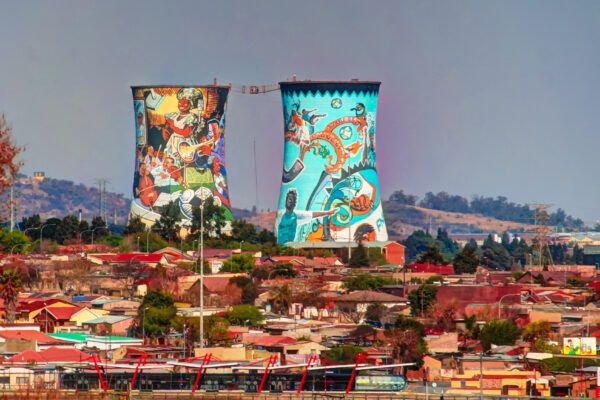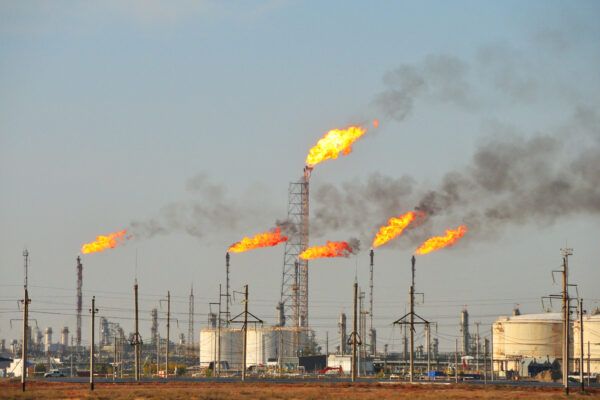Cities in Africa are growing rapidly: over 65% of the population will live in urban areas by 2060. This rapid urbanisation is drastically increasing air pollution and greenhouse gas emissions. Air pollution is already Africa’s second biggest cause of death, after HIV/AIDS. So how can African cities catalyse growth that is fast, fair and sustainable?
Our latest report reveals the health, economic and environmental impacts of air pollution in some of Africa’s fastest growing cities: Lagos, Cairo, Johannesburg and Accra. These cities could save over 125,000 lives, unlock $20billion for their economies, and cut greenhouse gas emissions by 20% by 2040.
The world is preparing for the COP27 in Egypt, where debate will focus on financing a just transition away from fossil fuel-led growth, while adapting to climate change. But current research highlights that levels of climate finance in Africa fall far short of the continent’s adaptation and mitigation needs, which would cost roughly 10% of the continent’s GDP.
Like climate change, air pollution is largely caused by burning fossil fuels. Yet air pollution is massively overlooked by policy makers and funders. These problems should be solved together. Without urgent action on clean air, the financial cost of air pollution in Africa’s cities is predicted to increase by over 600% by 2040.
From pollution to solution in Africa’s cities
Our report sets out the case for investing in air pollution and climate change together by focusing on four of Africa’s fastest growing cities. Our analysis maps the health, economic and climate impacts of increasing air pollution along a “business as usual” growth path. It then contrasts this trajectory with an alternative scenario in which cities implement clean air measures as they grow, such as upgraded public transport, cleaner cookstoves, and greener industrial technology and energy.
What do we mean by clean air measures?
We chose five indicative clean air policies to give a sense of what is possible. These policies address key sources of air pollution in the four cities – road traffic, industrial activities, household energy, land clearing and waste burning – while at the same time reducing greenhouse gas emissions. The clean air policies are:
- Strengthening public transport infrastructure to deliver a 25% reduction in gasoline and diesel fuel road traffic
- Deploying clean cookstoves and alternative fuel sources, to directly reduce household air pollution, and indirectly reduce ambient air pollution
- Switching to cleaner sources of energy for industry to reduce harmful emissions
- Implementing support systems to switch from slash-and burn to sustainable land-clearing practices
- Implementing waste management systems that improve collection, prevent open burning and improve incineration practices
The report breaks down the potential gains cities could see from taking these measures, for example:
- In Lagos, implementation of these policies could create efficiencies of up to $12.5billion and save over 64,000 lives between 2023-2040.
- Cairo would also see major benefits, including preventing over 52,000 premature deaths associated with the effects of air pollution between 2023-2040, and significant greenhouse gas reductions (with a reduction of 12% in 2040 alone).
- In Accra, the cumulative impact of clean air measures on air pollution could raise $250million and save over 3,000 lives between 2023-2040.
- In Johannesburg, the action on air pollution could potentially generate the city around $1billion from 2023-2040.
The findings suggest that similar gains could be achieved in other major cities experiencing exponential growth across Africa.
Key recommendations for sustainable growth
- Cities should commit to the C40 Clean Air Cities Declaration and planning framework. Cities should also improve tracking and reporting systems to provide data and evidence, which supports an integrated approach to emission control actions.
- National governments must review high-emitting sectors like energy, transport, industrial and power production to identify ways to reduce air pollution. They should also prioritise health and climate gains in infrastructure and service investments, and make action on air pollution an explicit priority in climate action and sustainable development activities.
- Funders should increase Official Development Assistance and other grant-based funding for air quality programmes, focusing especially on overlooked regions like Africa. Support should be diverted from fossil-fuel investments towards renewables.
View our full recommendations.
Africa’s rise is led by its great cities. The decisions made now will determine how fast and how fair their growth will be, and how long it will last. These findings show that cleaning the air is critical in building strong, healthy, inclusive economies that can power the carbon neutral markets and workforces of the future. Clean growth, supported by the international community, that avoids the devastating health and environmental consequences of fossil-fuel led urbanisation is now the better economic option too.”
– Desmond Appiah, Head of Ghana at Clean Air Fund

